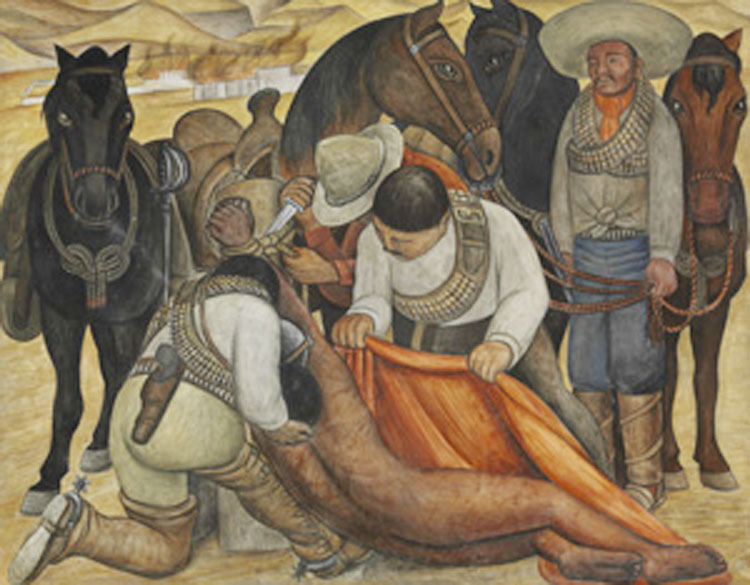by the El Reportero’s news services
Philadelphia Museum of Art — Spanning four momentous decades beginning with the revolutionary 1910s, this exhibition will cover an extraordinary range of images, from portable murals and large and small paintings to prints and photographs, books and broadsheets.
With works by Frida Kahlo, José Clemente Orozco, Diego Rivera, David Alfaro Siqueiros and Rufino Tamayo, Paint the Revolution will be the most comprehensive exhibition of Mexican modernism to be seen in the United States in more than seven decades.
Produced in partnership with the Museo del Palacio de Bellas Artes in Mexico City, the exhibition will highlight this extraordinary moment in the history of Mexican art.
Presentation Of The 3rd Annual Platino Awards of Iberoamerican Cinema
The announcement of the pre-selected eligible movies will be read by Mexican actress and President of the Mexican Academy of Cinema, Arts and Sciences Dolores Heredia, Mexican Actress Ofelia Mendez and Spanish Actor Eduardo Noriega.
In addition, the relevance of last year’s awards will be discussed and important news for the 2016 Platino Awards of Iberoamerican Cinema will be announced. More then 800 films are competing this year for this significant award.
With just two editions, the Platino Awards have become the leading Iberoamerican Cinema event of the year, bringing together 23 countries in a common goal, to advance and promote the creative and cultural richness of Iberoamerican Cinema.
The first annual Platino Awards Show was held on April 5, 2014 in Panama City and last year’s Award Show was held on July 17, 2015 in Marbella, Spain. The awards ceremony was broadcast to five continents, assuring its presence in more than 50 countries.
Cartagena Film Festival to pay tribute to Philippine director Mendoza
The International Film Festival of Cartagena (FICCI) will pay tribute to the work of Philippine filmmaker Brillante Mendoza with the screening of nine of his films, during the next event in March.
FICCI organizers praised the importance of the films made by Mendoza, who approaches the reality with rawness and tackles the harsh social events of the country with a bold and innovative vision on issues that are usually avoided by most commercial filmmakers.
A report issued by the promotion department of the festival indicates that participants will have the opportunity to appreciate the films made by Mendoza, a director who began his career as a production designer for film and theater and art director in advertising.
There are four films that will be premiered in Colombia during the festival, running from March 2nd to 7th, Masajista (Masseur) 2005, which won the Golden Leopard at the Film Festival of Locarno (Switzerland); Calor de verano (Summer Heat) 2006, El profesor (Professor) 2006 and Hijo adoptivo (Adopted son) 2007.
The tribute also includes the screening of two films, which earned him recognition in consecutive years at the Cannes Film Festival: Servicio (Service) 2008, and Kinatay 2009.
The tribute will be completed with Lola 2009, and Tu vientre (Your belly) 2012, which competed for the Golden Lion at the Venice Film Festival, along with his most recent film Trampa (Trap), which won special mention by the Ecumenical Jury at the Cannes Festival in 2015.
Mendoza, 56, has made 20 films, many of which have been prizewinning at major international festivals, and he recently received the title of Knight of Arts given by the French Government.
Cuba to Hold Int’ Meeting of Danzon Dancers
Cuba will host from March 30 to April 3 the First Edition of the International Danzon Dancers Meeting “Miguel Failde in Memoriam,” dedicated to the Mexican city of Zapopan, the organizing committee informed today.
The venue for this event will be this city, about 100 kilometers east of Havana, home of Failde, author of the first song of that genre, Las Alturas de Simpson, released here on January 1, 1879 by the then Artistic and Literary Social Club.
That rhythm has been historically recognized as an expression of identity and since 2013, it was declared an intangible Heritage of the Cuban nation, the call by the Cuban Institute of Music and Culture Direction in Matanzas said.
Couples from 16 to 60 years old can participate in the dance competition that will deliver First, Second and Third Prize: awards for the best three foreign couples and to the youngest duo.



